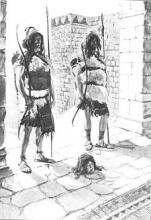As David ascends to total leadership over both Hebrew kingdoms, he quickly comes to realize what it means to be in such a high station. He has a nation full of people who see his power. Some admire him, some fear him and some challenge him. Most tragically, the moment people see David as a king is the moment he becomes disconnected from them. They no longer see a man, a friend, or even a proper partner. Chapters four and five of Second Samuel may depict the rise of our ostensible hero to the crown, but it can't help sounding sad and even, to an extent, empty.
Chapter four of the book begins with a gruesome event. Ish-Boshet, the last son of Saul, is murdered in his bed by two of his father's military captains. Once again, we must ask ourselves why the text takes the time to describe the killing in such detail. Countless times throughout scripture people are born and die with hardly a single sentence devoted to them. That this chapter gives half of its text to Ish-Boshet's death is a sign that we should think about its implications.
Ish-Boshet's murder is ghastly. It happens in broad daylight in his own home while he rests from the midday heat. Trusted men from his past arrive under false pretenses, beat him, slaughter him in a fashion usually employed by vengeful foreigners, then desecrate his body by beheading him. The real horror of this situation is that they committed the murder as an act of homage to David. Just like the Amalekite wanderer or robbed Saul's corpse, David meets this supposed act of honor with the death penalty.
In this transitional period when David is anointed, he essentially watches all that was good from his past turn into politicized ugliness. His loyal subjects frequently present as murderers and thieves, not the honorable warriors who followed him when the odds were grim. His former protectors in the Philistines show up in his kingdom as marauders and interlopers. As a leader of no particular station, David was a friend to them. As the head of a nation, he can no longer tolerate them. David marches against the Philistines and defeats them roundly.
But the part of this segment of the story that strikes me most during this recent reading is how David's love life changes. During this time he takes numerous other wives and concubines, producing several children, the future king Solomon among them. All these new lovers are treated dismissively in the text, never named or otherwise described. The implication in the syntax is that David makes this family as a national duty. It is just another step in the building of his house, just like the materials gifted to him by King Hiram of Tyre.
Compare these pairings of obligation with the complex, meaningful relationships David had as a younger man. He has no analog to Jonathan, no new wife so brave as Michal or admirable as Abigail. By ascending to a position of power, David has been forced to relinquish the human contact that always drove him in his righteous youth. Given this reading, David's later sins of the heart or of lust become easier to understand or even excuse.
